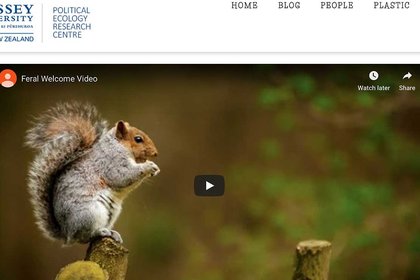
A “nearly-carbon neutral conference” hosted by Massey University social scientists is featured on the London School of Economics (LSE) Impact Blog as an example of how academics are deploying sustainable practises in research and education.
Organisers of last November’s fully-online international “Feral” conference, which explored human interactions with the natural world, published a blog on the site this week sharing insights into the environmental benefits of hosting a conference online.
The team, from Massey’s multi-disciplinary Political Ecology Research Centre (PERC), including Dr Nick Holm, Dr Sy Taffel and doctoral student Lisa Vonk from the School of English and Media Studies, and Dr Trisia Farrelly from the School of People, Environment and Planning, say that hosting an entire conference online can reduce the carbon footprint and make such events more accessible to a wide range of participants around the globe.
“The online-only conference format aligns with the values of PERC because it allows us to minimise the environmental cost of sharing academic research,” they say in the blog. The Feral conference was defined as “nearly neutral” because it still relies upon the material infrastructures of the internet and the energy costs associated with it.
New Zealand’s relative geographical isolation meant this format has “the added benefit of potentially attracting a broader range of international delegates, who might not be able to cope with the financial, temporal, or physical burdens imposed by the long haul flights otherwise necessary to physically attend a conference at Massey University.”
Dr Holm says the concept is experimental, but he is “very pleased that PERC’s commitment to international collaboration and new ways of sharing knowledge has attracted international interest. The LSE Impact Blog provides a great forum for sharing the lessons we’ve learned about how we make research both more sustainable and more equitable.”
The London School of Economics blog site has over 15,000 views a week, and the topic of their blog is particularly popular, he says.
The Feral conference – co-hosted with Netherlands-based Wageningen University’s Centre for Space, Place and Society – featured 43 presenters and panellists from eight countries who collectively produced over thirteen hours of open access video.
The conference web pages received over 9,200 page views and over 150 comments were posted in the forums that acted in lieu of traditional question and answer sessions – results that reflect the success of the event and the format, the PERC team say.
Challenges in running an online conference included managing different time zones for participants. “Online conferences also have to negotiate time in a way that is quite different to place-based events; because participants are not located in the same time zone, having synchronous events becomes complex,” they wrote.
Another challenge was that presenters who did not have the correct privacy settings were open to abusive comments from the wider YouTube audience; “who are not always known for the respectfulness, nor the quality of their contributions,” the team wrote.
The PERC researchers expressed a desire for the online conference model to be more widely embraced, despite its challenges. Feral was their second online international conference, with the inaugural one in 2017, titled The Lives and After-Lives of Plastic. They are currently discussing plans for their next online conference in 2020, on extraction industries.